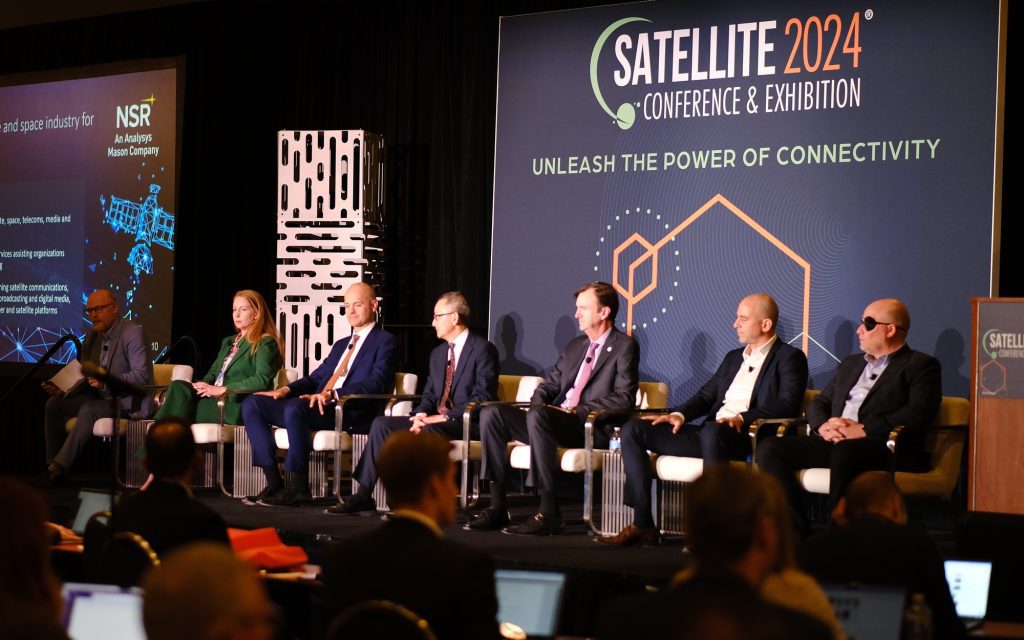WASHINGTON — The space industry is moving into new groups of rockets and trying to add more capability to the market while competing against more rivals.
A panel at the Satellite 2024 conference on March 18 showcased two companies that recently completed successful first launches of new rockets, along with four others developing new rockets, sometimes while still using current ones.
“Right now we’re in transition,” said Mark Peller, vice president of Vulcan development at United Launch Alliance, referring to the successful first launch of Vulcan Centaur on Jan. 8. “We’ve tested the Vulcan system and now our focus is on increasing the number of launches.”
He mentioned that the company has “many” Vulcan launches planned but was not more specific. The next launch, carrying Sierra Space’s Dream Chaser, is expected no earlier than this summer, depending on when that spacecraft completes environmental tests and other prelaunch preparations.
Mitsubishi Heavy Industries (MHI) successfully launched its H3 rocket on Feb. 16 after the rocket’s first launch failed nearly a year earlier, a setback that Iwao Igarashi, vice president and general manager at MHI, called a “nightmare.” “There were no major problems with the rocket” on its second flight, he said.
Next up is Ariane 6. “We are very excited to announce that, in approximately 90 to 100 days, we’re going to see the inaugural flight of our new Ariane 6 rocket,” said Steven Rutgers, chief commercial officer of Arianespace. That would put the launch in the latter half of June, the start of a launch period previously announced by the European Space Agency that extends through July.
Two other companies, Relativity Space and Rocket Lab, are in earlier stages of developing medium-size reusable rockets. Relativity is still aiming for a 2026 launch of its Terran R rocket, said Josh Brost, chief revenue officer at the company, as it tests the rocket’s Aeon R engines and builds a new production facility in Long Beach, California.
Rocket Lab, which operates the Electron small rocket, previously mentioned that its larger Neutron rocket could be ready as soon as the end of the year, although full-scale tests of that rocket’s Archimedes engine have not begun. Adam Spice, Rocket Lab’s chief financial officer, reaffirmed that plan on the panel.
All those companies are trying to catch up to SpaceX, which completed 96 launches of Falcon 9 and Falcon Heavy rockets in 2023 and aims for 148 launches this year, said Stephanie Bednarek, vice president of commercial sales. “We’re aiming for more than that the following year.”
This is happening as the company develops Starship, with a much larger capacity and potentially much lower prices per kilogram. Any transition from Falcon to Starship will be gradual, Bednarek said. “We’ll be operating both systems for quite a while, so it’s not a hard switch from Falcon to Starship,” she said. “We’ll be flying Falcon as long as our customers want to fly it.”
While companies that send things into space continue to argue that there is not enough space in the market, especially as companies switch to newer vehicles, they are trying to find ways to stand out and get an advantage. Peller mentioned that ULA is focusing on its ability to create specific paths for customers, using the power of Vulcan Centaur.
“Can you ask for more money for custom services? Definitely, but it has to be competitive,” Rutgers said. One example, he mentioned, is helping organize transportation for customers’ stuff to the launch site using planes and ships that are not easy to find.
Bednarek said SpaceX will offer custom services for customers, like figuring out the best paths for customers who are buying the full power of a Falcon 9 or Falcon Heavy. “We also help match up customers sometimes,” she said. “If someone doesn't need the full power of the vehicle but has a unique path, we can often find someone else to share the trip.”
As other companies introduce their launch vehicles, they are hoping to find the right combination of cost, power, and other qualities that can compete with SpaceX’s current advantages. “Hopefully we can make Stephanie lose some sleep,” Spice said.









